"Cherishing Little Steps - A Haven for Baby and Family Journeys"
Hydration for Young Children: How Much Water Do They Need?
Did you know that children have higher water requirements relative to their body weight compared to adults? Understanding how much water young children need is crucial for their health and well-being. Factors like activity levels, weather conditions, and illnesses can impact their hydration needs, making it essential to ensure they are adequately hydrated. But how can you determine the right amount of water for your child? Stay tuned to discover practical tips and guidelines for keeping your little ones properly hydrated and healthy.
Key Takeaways
- Toddlers aged 1-3 years need about 4-6 cups of water daily.
- Preschoolers aged 2-3 years require about 4-5 cups of water daily.
- Additional fluids may be necessary during hot weather or illness.
- Hydration needs vary based on activity levels and environmental conditions.
- Caregivers should monitor and encourage adequate water intake for children.
Importance of Hydration in Children
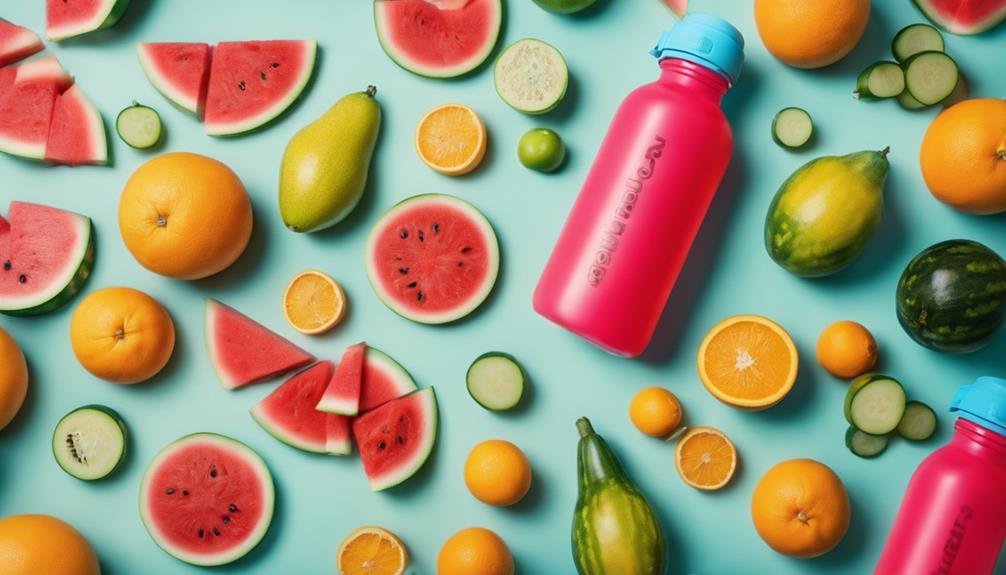
Ensuring proper hydration in young children is crucial for their overall health and well-being. Children have higher water requirements in relation to their body weight compared to adults, making it vital to monitor their fluid intake regularly. Dehydration can affect a child's physical and cognitive development, leading to issues such as fatigue, irritability, and difficulty concentrating. It's essential to encourage children to drink water throughout the day, especially during physical activity or in hot weather, to prevent dehydration.
Children may not always recognize their own thirst cues, so caregivers play a significant role in ensuring adequate hydration. Offering water-rich foods such as fruits and vegetables can also contribute to meeting a child's daily fluid needs. By establishing healthy hydration habits early on, you're setting the foundation for a lifetime of good health and well-being. Remember, staying hydrated isn't only essential for physical health but also for maintaining optimal cognitive function and overall performance.
Water Requirements for Infants
Proper hydration is crucial for infants, given their higher water requirements relative to body weight compared to adults. Infants have a limited ability to regulate their body temperature and are more susceptible to dehydration than older children and adults. For infants, water isn't just essential for overall hydration but also plays a vital role in various bodily functions, such as digestion, circulation, and temperature regulation.
In the early months of life, infants primarily rely on breast milk or formula for their hydration needs. Breast milk contains a high water content, providing infants with the necessary fluids to meet their requirements. It's important for caregivers to ensure that infants are fed on demand to maintain adequate hydration levels.
During hot weather or illness, infants may require additional fluids to prevent dehydration. Signs of dehydration in infants include dry mouth, fewer wet diapers, sunken eyes, and fussiness. Caregivers should consult healthcare providers if they suspect their infant is dehydrated to prevent any complications. Remember, always prioritize hydration for the health and well-being of your little one.
Recommended Intake for Toddlers
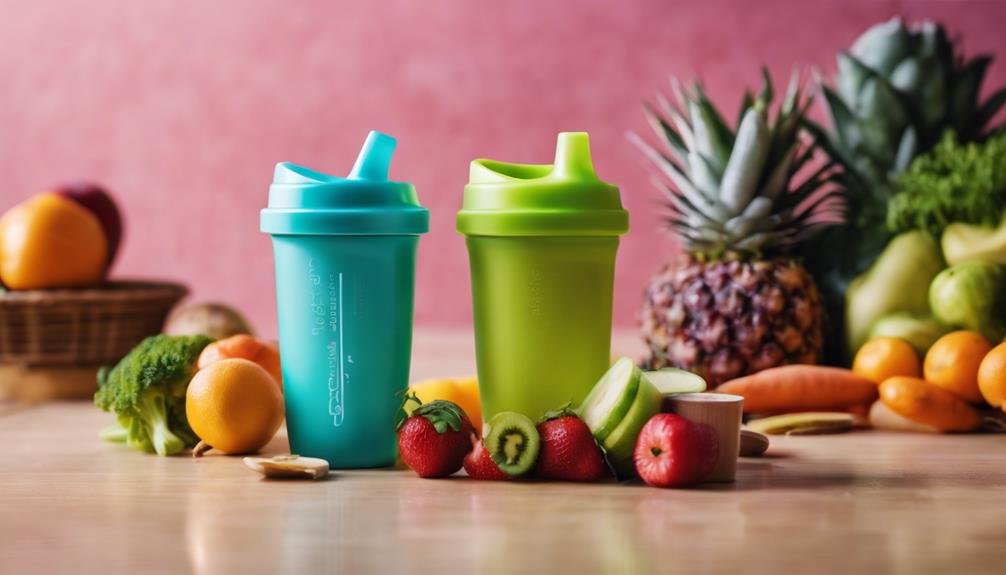
To ensure optimal hydration for toddlers, it's essential to consider their specific fluid intake needs based on their age and activity level. Toddlers have unique requirements when it comes to staying hydrated. Here are some key points to keep in mind:
- Fluid Intake: Toddlers aged 1-3 years typically need about 4-6 cups of water per day.
- Activity Level: Adjust their water intake based on how active they are. More active toddlers may need additional fluids to stay hydrated.
- Signs of Dehydration: Watch out for signs like dry mouth, few tears when crying, or dark yellow urine, as these could indicate dehydration.
- Offer Water Regularly: Encourage your toddler to drink water throughout the day, especially during meals and snacks.
Hydration Guidelines for Preschoolers
For preschoolers, maintaining adequate hydration levels is crucial for their overall health and well-being. Ensuring that your child stays properly hydrated can positively impact their cognitive function, mood, and physical performance. The American Academy of Pediatrics recommends that preschoolers aged 2-3 years old should consume around 4-5 cups of water per day, while children aged 4-8 years old should aim for 5-7 cups daily. However, individual hydration needs may vary based on activity levels, climate, and overall health status.
| Age Group | Recommended Daily Water Intake |
|---|---|
| 2-3 years old | 4-5 cups |
| 4-8 years old | 5-7 cups |
Encouraging your preschooler to drink water throughout the day, especially during meals and physical activity, can help them meet their hydration needs. It is essential to monitor your child's fluid intake and look out for signs of dehydration, such as dark urine, dry mouth, or fatigue. By following these guidelines and promoting healthy hydration habits, you can support your preschooler's overall well-being and development.
Factors Affecting Hydration Needs
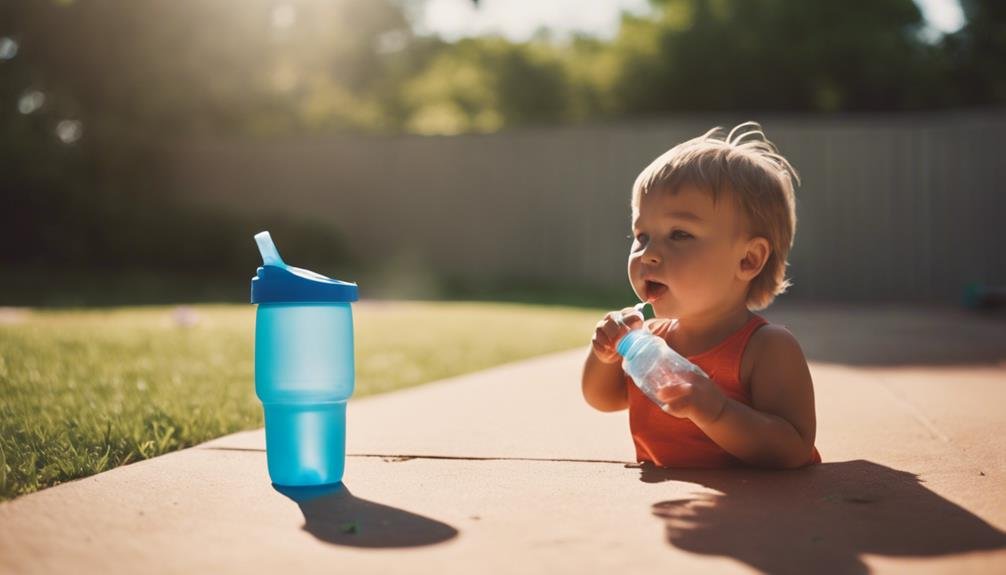
Factors influencing hydration needs in young children include their activity levels, environmental conditions, and overall health status. Understanding these factors is crucial to ensure your child stays properly hydrated throughout the day. Here are some key points to consider:
- Activity Levels: The more active your child is, the more water they'll need to replenish fluids lost through sweating and exertion.
- Environmental Conditions: Hot and humid weather can increase the body's need for water, as can high altitudes or dry climates.
- Overall Health Status: Illnesses such as fever, vomiting, or diarrhea can lead to increased fluid loss and may require extra attention to hydration.
- Dietary Habits: A diet rich in fruits and vegetables can contribute to overall hydration levels, while excessive consumption of salty or sugary foods may increase fluid requirements.
Signs of Dehydration in Kids
Understanding the signs of dehydration in kids is vital for parents to monitor and maintain their child's hydration levels effectively. Dehydration in children can be subtle but knowing what to look for can help prevent more severe complications. One common sign is dry lips and a dry mouth. If your child is unusually thirsty or has been urinating less frequently, these could also be indicators of dehydration. Keep an eye out for dark yellow urine or a decrease in the number of wet diapers for infants.
Additionally, if your child is overly tired, irritable, or dizzy, dehydration might be the cause. Sunken eyes, lack of tears when crying, and cool, dry skin are further signs to be aware of. If you notice any of these symptoms, it's essential to offer your child fluids immediately and seek medical advice if the signs persist. Regularly monitoring your child's hydration status is key to keeping them healthy and happy.
Tips for Encouraging Hydration
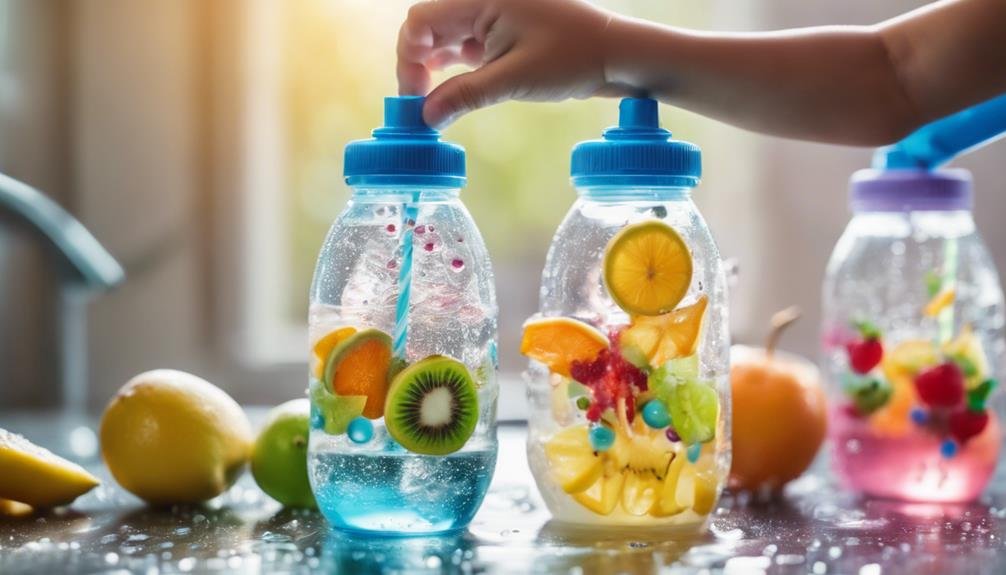
To help young children stay hydrated, it's important to make drinking water fun and easily accessible throughout the day. Here are some expert tips to encourage hydration:
- Use colorful cups: Serve water in vibrant cups or bottles with their favorite cartoon characters to make drinking more exciting.
- Create a hydration chart: Make a chart with stickers for each glass of water consumed, turning hydration into a fun game.
- Infuse water with fruits: Add slices of fruits like berries or citrus to water to give it a hint of flavor, making it more appealing.
- Offer water-rich snacks: Include snacks like watermelon, cucumbers, or oranges in their diet to boost overall hydration levels.
Hydration During Physical Activity
During physical activity, ensuring proper hydration is essential for maintaining performance and preventing dehydration. When your child is active, their body temperature rises, leading to increased sweating and water loss. To support their performance and overall well-being, encourage your child to drink water before, during, and after physical activities.
Before starting any exercise, remind your child to drink about 5-10 ounces of water, especially if it's been a while since their last drink. During the activity, encourage them to take small sips of water every 20 minutes to stay hydrated. After they finish, make sure they replenish the fluids lost during exercise by drinking water to quench their thirst.
Healthy Hydration Habits for Kids
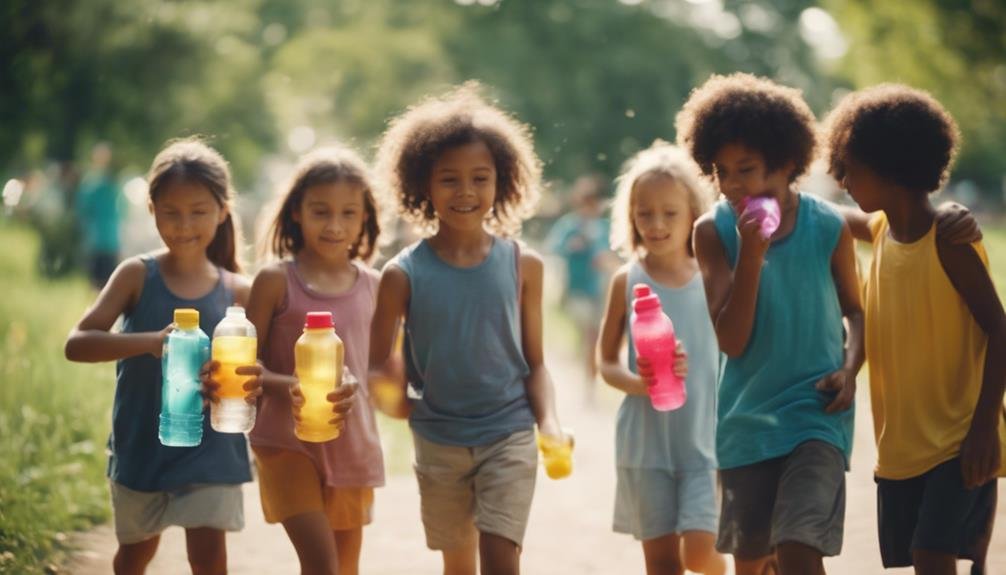
For optimal health and well-being, it's crucial for kids to establish and maintain healthy hydration habits. Ensuring that your child stays properly hydrated is essential for their overall health. Here are some expert tips to help your child develop healthy hydration habits:
- Encourage Water Consumption: Make water the primary choice for hydration to instill the habit of reaching for water first.
- Lead by Example: Show your child the importance of drinking water by regularly drinking it yourself throughout the day.
- Limit Sugary Drinks: Reduce the consumption of sugary beverages and juices, as they can add unnecessary calories and sugar to your child's diet.
- Use Fun Water Bottles: Invest in colorful and fun water bottles to make drinking water more enjoyable for your child.
Frequently Asked Questions
Can Flavored Water Count Towards a Child's Daily Hydration?
Yes, flavored water can count towards your child's daily hydration. However, be mindful of added sugars or artificial sweeteners. Opt for natural flavors or infusions for a healthier choice. Remember, water remains the best hydrating option.
Are There Any Specific Water Temperature Recommendations for Children?
For children, aim for water that's comfortably cool, not too cold or warm. This can encourage hydration without shocking their system. Keep it refreshing to entice them to drink up and stay hydrated.
Should Children Drink More Water During Illness or Fever?
During illness or fever, children should drink more water to stay hydrated. It helps regulate body temperature and supports the immune system. Encourage sips throughout the day and offer fluids like water, clear broths, or electrolyte solutions.
Can Fruits and Vegetables Contribute Significantly to a Child's Hydration?
Eating fruits and veggies significantly boosts a child's hydration levels. They contain water and essential nutrients. Did you know that watermelon is about 92% water? Enjoy these healthy snacks to keep your little one hydrated!
Is It Necessary to Track a Child's Daily Water Intake Precisely?
You don't need to obsess over tracking every drop your child drinks daily, but it's wise to ensure they're adequately hydrated. Keep an eye on signs of thirst and offer water regularly to promote good habits.
Conclusion
In conclusion, ensuring your little ones stay well-hydrated is key to their overall health and development. By monitoring their water intake and encouraging healthy hydration habits, you're setting them up for success.
Remember, a well-hydrated child is a happy and thriving child. Keep up the good work in keeping them hydrated and happy!



My cousin told me about this website, but I’m not sure if he made this message because no one else understands my issues as well as he does. Thank you; you are very fantastic.
Приветики!
Приобретите диплом Вуза с доставкой по России без предоплаты и полной уверенностью в его подлинности.
http://saksx-attestats.ru/
Выбрать и купить диплом Вуза России недорого, качественно и с возможностью отправки почтой!
Приобретите документы об образовании всех ВУЗов России по выгодным ценам с постоплатой и помощью 24/7!